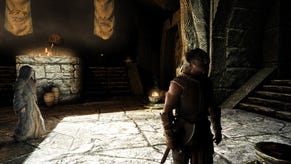Digital Foundry: PS3 Skyrim Lag Fixed?
Full analysis of the improvements brought about by this week's patch.
Is my save playable again? This is the question PS3 owners will be asking themselves as they slot their Skyrim disc back in and download the latest patch.
Patch 2.03 - equivalent to 1.04 on other platforms - sets out to make amends for the severe bouts of stuttering that plague Skyrim's playability on Sony's console. Notoriously, this has had a greater impact on those with a larger time investment in the adventure, with performance deteriorating the further players progress and the more they interact with the world and its characters.
As detailed in our previous dissection of the phenomenon, the catch with this bug is that it has little to do with the hardware's graphical output; a new save running on the same patch, and through the exact same areas, manifests no such problems. A memory management issue stemming from larger-sized save files, and issues with the PS3's more restrictive split-RAM setup, were assumed the most probable causes at the time, with no absolute explanation being put forward so far. Bethesda's knee-jerk response to the problem last year arrived by way of patch 2.01, where some improvements were made, although the stuttering still persisted to an unacceptable level.
So here we are, three months later with the long-awaited patch 2.03 - but does it do a better job? To measure the change as best we can, we follow Bethesda's patch notes to a tee by loading up our 65-hour save and then saving to a new slot manually - a process which reduces our file size from 12MB to 11MB. After the recommended restart, we load this smaller 65-hour save state and fast travel between several major locations on the map for about 40 minutes in an attempt to initiate the bug fully. Finally, we run through a set route, from Riverwood to Whiterun and closing at Falkreath, with the results being paired against the very same save treading an equivalent path on patches 2.00 and 2.01. The results are enlightening, and we think you'll be pleased.
It's clear from these tests that Skyrim's lag issue has been reduced considerably. Where playthroughs on previous patches show wild fluctuations in frame-rate, patch 2.03 offers far greater consistency in performance and can diminish instances of stuttering outright in certain cases. Passing through Riverwood village, for example, gives us a reading that holds much closer to the game's target 30FPS, with the worst stutter bringing it down to 22FPS for a brief spell. Compared to the previous patch, where passing by the same spot forces the game to come crashing down to 0FPS for a few seconds, this is a giant and much-welcomed leap forward.
We're relieved to see that the walk downhill, en-route to Whiterun castle, now holds out at a more constant 25FPS as well rather than wavering erratically around the 15FPS mark. It's this spot in particular that we find the patch notes are worth adhering to. They state that "strange behaviour" is to be expected as a "temporary effect of Skyrim scripts correcting themselves after the update".
By their advice, the best way to hasten improvements to performance is to immediately make a manual save and restart the console. Prior to following these steps we noticed that playing this downhill section on an unmodified 12MB save file gave us no improvements whatsoever, with the downsizing to 11MB making an immediately noticeable difference.
Farewell to Rimlag?
So yes, we're impressed with the progress, but not without reservations on the issue. Being that the above tests are all relative to previous stuttering 65-hour playthroughs, we're left with one last question: has the so-called "Rimlag" bug been eradicated entirely? To test this, we run through the very same locations once again with an entirely brand new save, and compare it to performance on our cherished 65-hour save. Both are running on the same 2.03 update, and as before, each are given 40 minutes of fast-travelling activity between the major kingdoms to make sure that the bug is fully set in.
"Generally speaking, it's apparent that the root cause of the problem has been addressed in such a way that its effects are diminished to a tolerable level rather than solved outright."
The above video helps put the effects of the bug back into perspective, and we begin to see what ground there is left to cover. Both sides of the video broadly show the same geometry, textures and effects being rendered on the same console at any one moment, with the weather and time being matched as closely as possible in each case. However, regardless of the like-for-like pairing of the two sides, there is an obvious chasm in performance that favours the new save, and which can't be accounted for by the visual elements alone. If performance is fine on one, then why not the other?
Generally speaking, it's apparent that the root cause of the problem has been addressed in such a way that its effects are diminished to a tolerable level rather than solved outright. Sadly, this also further cements the theory that the bug is characteristic of how Skyrim's engine handles the caching of saved data over time, and will likely always remain unresolved to some extent. That being said, the game is now ostensibly in fully playable state for long-term PS3 players, which is cause for celebration for those affected.
The Root of the Problem
But why did it take Bethesda so long to turn things around? Its determination to get to the heart of the problem has been quite evident to some members of the gaming press with a PS3 copy, several of whom were contacted for more information. Since putting the first Skyrim lag article up three weeks after launch, we at Digital Foundry were among those contacted, with several calls coming our way asking for our affected save file, a step-by-step bug report, as well as feedback on some tests.
Details of the best way to reproduce the bug were fleshed out from our side, but nothing concrete was revealed from Bethesda's about their understanding of its cause. This gave us cause for concern, especially as one requested test had us unplugging the power cable before resuming play, with the assumption being that it would somehow impact performance.
"All things considered, the turnaround for patch 2.03 has been positive overall. Based on our experiences so far, the update delivers on Bethesda's promise of an improvement to performance."
This apparent difficulty in honing in on a single root cause for the problem has also been made evident with a recent 1.04 beta patch note for the PC. Here, the PS3 version is alleged to optimise a "bookshelf script in player-owned houses that would occasionally cause active scripts to lag and also cause an increase to saved games file size". This is a curious detail given its obscurity, and could well be an example of the many "one-off" instances of scripting which have to be manually tweaked to avoid the same problems across the game's gargantuan world.
All things considered, the turnaround for patch 2.03 has been positive overall. Based on our experiences so far, the update delivers on Bethesda's promise of an improvement to performance - and save for an increased delay on selecting the save option, sacrifices to the rest of the game's look and design seems to remain in place. There has been some talk of reduced draw distance and textures issues with the new update, but we ran the new version up against a 2.02 build side by side and could see no apparent visual differences. That said, we have no doubt that a slew of specific changes - some that may be without mention on the patch list - have accompanied this fix, and bearing in mind this studio's history, we can only hope that new bugs haven't been introduced as has been the case in previous updates.
While the Rimlag fix is obviously good news, fans still have a right to be disappointed. After all, it's been three months to the day since the game's release in the US, and the wait for an official solution to the problem has been much too long in the pipeline for some. It's also hard to congratulate the developer so readily for their successes with this patch, given that the game's current playability represents the state Skyrim should have been released in on day one.
The silver lining to this debacle is that Bethesda may well be spurred on to make a significant change to its quality assurance policies, because clearly a highly vocal fanbase will be subjecting future Bethesda games based on this engine with an extreme level of scrutiny. The success of Skyrim remains an astonishing commercial breakthrough for both the company and Elder Scrolls franchise, but it's fair to say there are some who won't be so quick to forget their early experiences with the game.









